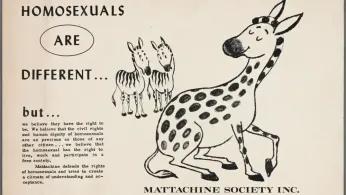
8 hours ago
Mattachine Society: The Enduring Legacy of an Early LGBTQ+ Rights Movement
READ TIME: 4 MIN.
In the early 1950s, at a time when LGBTQ+ people in America faced entrenched discrimination, criminalization, and widespread social invisibility, a small group of activists in Los Angeles ignited a movement that would reverberate across generations. The Mattachine Society, founded in 1950 by Harry Hay and his colleagues, became one of the first sustained organizations devoted to protecting and advancing the rights of gay men and, eventually, the broader LGBTQ+ community. Their work not only addressed immediate legal and social injustices but also fostered a sense of identity, solidarity, and hope—an enduring legacy symbolized today by locations such as the "Mattachine Steps" in Los Angeles .
The Mattachine Society emerged in 1950, created by Harry Hay—an activist with roots in the Communist and labor movements—and a small circle of friends who recognized the urgent need for collective action to defend the rights and dignity of gay men. At the time, homosexuality was widely criminalized, pathologized by the medical establishment, and condemned by mainstream religion. Police entrapment, job loss, and familial rejection were common realities for LGBTQ+ individuals .
Drawing inspiration from other minority liberation movements, the Mattachine Society called for grassroots organizing and community-building. The name “Mattachine” itself was inspired by a medieval French troupe of masked performers, symbolizing the double lives many LGBTQ+ people were forced to lead.
A central innovation of the Mattachine Society was its network of discussion groups, which provided rare safe spaces for LGBTQ+ individuals to share experiences, build solidarity, and cultivate a sense of belonging. These meetings, often described as emotional and cathartic, represented a significant departure from the isolation and secrecy that had long characterized queer life in America.
By 1951, the Society had adopted a formal Statement of Missions and Purposes, emphasizing both the need for civil rights activism and the importance of nurturing a distinct, ethical homosexual culture. The Society’s vision paralleled other minority movements, seeking recognition of queer people as a legitimate and valuable part of democratic society .
The Mattachine Society also pioneered LGBTQ+ publishing. Its periodicals, including "ONE: The Homosexual Viewpoint" and "The Mattachine Review," documented queer experiences, addressed pressing issues, and helped shape a national consciousness among LGBTQ+ people .
A core element of the Mattachine Society’s work was legal advocacy. Members organized to defend those targeted by police entrapment and to provide legal advice and support to LGBTQ+ individuals arrested under discriminatory laws. The Society’s efforts included direct engagement with city officials and law enforcement, as well as public campaigns against bar raids and other forms of harassment .
In April 1952, when one of the Society’s founders was entrapped by the Los Angeles vice squad, Mattachine mobilized the community to contest the charges in court, marking one of the first collective legal defenses in LGBTQ+ history.
The Society’s impact extended nationally, with chapters forming across the United States—including in cities like Chicago, Washington, D. C. , and New York. Each chapter adapted to local conditions, balancing political activism with social service and support. For example, Mattachine Midwest, founded in 1965, became Chicago’s first enduring gay rights organization, blending advocacy, education, and direct service.
The Mattachine Society understood the importance of coalition-building and outreach beyond its immediate membership. In the 1960s, its Washington, D. C. chapter—founded by Frank Kameny and Jack Nichols—sought to bridge divides with religious communities, aiming to integrate LGBTQ+ individuals into religious life and reduce alienation. The Society also worked to change public perceptions through media outreach, press conferences, and educational campaigns.
By the mid-1960s, Mattachine had become a prominent force in the broader “Homophile Movement,” a network of organizations advocating for homosexual rights through non-confrontational means. While some historians have noted that this approach led to internal tensions and eventual splintering, others credit the Society with laying the foundation for the more radical activism that would follow in the wake of the Stonewall Uprising in 1969.
Although not directly involved in the Stonewall Uprising, the Mattachine Society played a key role in the immediate aftermath. In June 1969, after riots erupted at the Stonewall Inn in New York City, Mattachine leaders met with city officials and advocated for peaceful protest, famously posting a message in the Stonewall Inn window urging the community to "maintain peaceful and quiet conduct on the streets of the Village".
The Society’s influence continued into the 1970s and beyond, as former members and allied organizations helped catalyze a more visible, confrontational, and diverse LGBTQ+ liberation movement. Mattachine’s early focus on legal defense, media representation, and community-building became cornerstones of later activism .
One of the most tangible reminders of the Mattachine Society’s legacy is the "Mattachine Steps, "a public stairway in the Silver Lake neighborhood of Los Angeles. This site, now an official Los Angeles Historic-Cultural Monument, was a frequent meeting place for Harry Hay and other founders. The steps have become a pilgrimage site for those seeking to honor the roots of LGBTQ+ activism and reflect on the community’s ongoing struggles and achievements.
The Mattachine Steps symbolize both the literal and figurative steps taken by early activists to climb out of the shadows, assert their dignity, and demand visibility. Annual commemorations and educational events at the site reinforce its importance as a touchstone for LGBTQ+ memory and pride.
The story of the Mattachine Society and the Mattachine Steps is a testament to the courage, vision, and perseverance of early LGBTQ+ activists. Their insistence on dignity, community, and equal rights—undertaken in an era of profound hostility—helped transform the landscape of American civil rights. Their strategies, from legal advocacy to consciousness-raising, remain relevant for contemporary movements seeking justice and inclusion.
As new generations of LGBTQ+ people and allies climb the Mattachine Steps—both literally and metaphorically—they continue a tradition of activism and resilience that began more than seventy years ago. The story of the Mattachine Society is not only a chapter in history but an ongoing call to action and solidarity.






